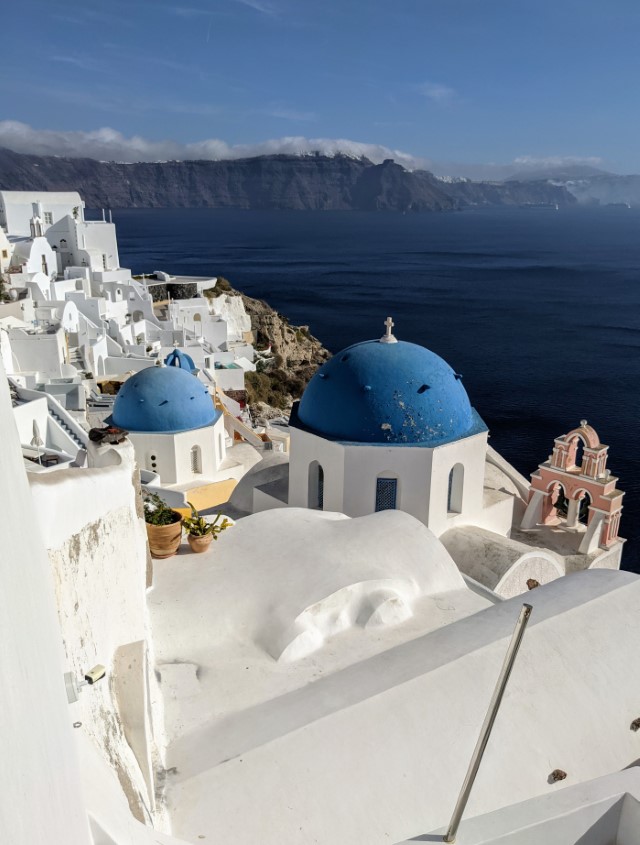To round out our 10 weeks in Central Europe, we took a quick tour of some of the Greek Islands. We were fortunate with weather as we had no rain and the temperature was pretty moderate. Here are some highlights from the islands:
Mykonos
Like most of the Greek islands, the vast majority of the buildings are white stucco finish, with lots of pastel trims, especially blue. Even the grout around the street flagstones is painted white. It’s not just for looks, these islands get quite hot in the summer. There are windmills on many islands, including a row of white ones on this island. The Venice quarter of Mykonos town goes right up to the sea.
Patmos
We hiked up the hillside to the cave where the apostle John was exiled and received the visions upon which the Book of Revelations is based. There is a whole complex built around the cave now. At the top of the hill is St. John Monastery, which looks like a castle. The museum in the monastery had some interesting relics, including a painting that some attribute to “El Greco” from before he went to Spain. Around the monastery there is a maze of white buildings. We wandered through these houses to get to some more windmills on the hillside. The area must be primarily for vacationers as it was nearly deserted. We did find a bakery, and bought two awesome doubled cookies, dipped in chocolate with apricot jam between the cookies. Later, I did a solo hike to ruins on the adjacent hill. Ancient pottery shards were everywhere.
Rhodes
The city of Rhodes is very large medieval walled city. The island is within sight of Turkey, and was last stronghold of Christian knights against Ottomans. The Palace of the Knights was restored during the Italian occupation of Rhodes by Italians, with dozens of intact Roman mosaic floors that were excavated on the island of Kos and incorporated in the renovation. I also walked the whole moat, which took about 45 minutes. It is a really big fortress. Note the TV cabinet, made hundreds of years before the invention of the TV!
Heraklion, Crete
Crete is a large, long island, and the port city of Heraklion is a big, modern city. In the old Venetian port the Koules fortress sits right on the water. We also visited the Heraklion Archaeological Museum which is filled with more amazing artifacts. We dipped our feet in the Aegean sea at a tiny beach right in town and watched a small contingent of locals swim, dance, and socialize.





~6500 year old stove and ladel 
Minoan Bee pendant 


pot design essentially unchanged in past 3600 years 
3600 year old drink dispenser. pour into neck, dispense through nose… 


beautiful 3500 year old gold jewelry 

Augustus Ceasar
Olympia (Peloponese Penninsula)
We took a bus trip directly from Katakolon inland to Ancient Olympia. Bad diesel fuel sidelined our bus for about 30 minutes on the way there, but we still had plenty of time. The Greeks held the Olympics at this place every 4 years for about 1100 years (776 BC to 393 AD). It was pretty cool to walk the length of the track and see the ruins of the many adjacent buildings. We also saw Olympic related artifacts in the Olympia Museum, and a host of amazing general artifacts in the Archeological Museum. Shown below is part of the original starting block, with hole for a lane marker, brass toys and statues, a statue of Nero’s second wife, the original Olympic track (almost 200 m straight track) with a literal starting block made of stone.
Santorini
This is probably the most photographed island in Greece. We certainly did our share of picture taking. Traditionally people ride a donkey up the switchback stone stepped path from the sea to the ridge to Fila, the town that truly clings to the edge of cliffs overlooking the sea. The back side of Santorini slopes more gently to the sea. We walked along ridge, taking pictures and eventually caught the bus to Oia, the village at the end of the island which also clings to the cliffs. Lots of walking and picture taking. Sunglasses are a must here with the bright sun and white buildings.











































































Leave a Reply to Stacy Sipherd HarmonCancel reply